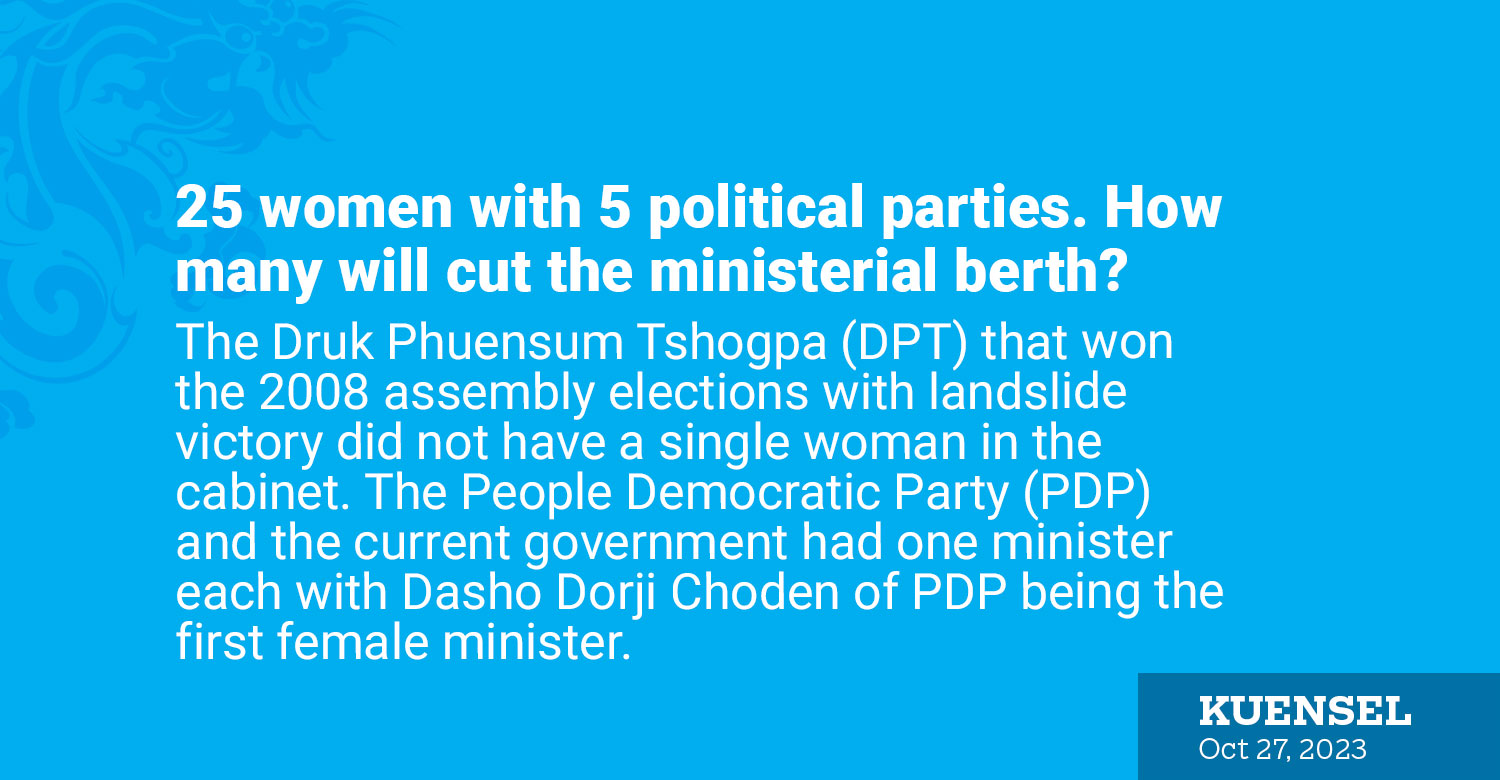Parties say they have not decided on ministerial portfolio
Chencho Dema
The Druk Phuensum Tshogpa (DPT) that won the 2008 assembly elections with landslide victory did not have a single woman in the cabinet. The People Democratic Party (PDP) and the current government had one minister each with Dasho Dorji Choden of PDP being the first female minister.
There are 25 women candidates with the five political parties contesting the 2023 elections. Will there be more women representation in the Cabinet?
There is no quota system and who becomes a minister is dependent on the political party. It is too early to say, party spokespersons say.
After winning the primary round in 2018, DNT and DPT had five candidates each among the 94 candidates vying for a seat in the National Assembly. Of the 10, seven women were elected.
Health Minister Dechen Wangmo is the only woman in the cabinet that is made of 10 ministers including the Prime Minister.
As the primary round nears, not many talk about women representation in the Cabinet, but observers, especially women, speculate that there will not be much going by the practice of appointing a female minister and the insignificant number of women contestants.
Women still face systemic obstacles in politics, a 34-year-old civil servant said.
“It will be a disappointment if the new government misses the opportunity to appoint a balanced Cabinet in 2024 given a good number of capable female candidates,” she added.
Just two women have held full Cabinet ranks in the last 15 years.
With 25 women contesting, it is the maximum in the last 15 years. However, the number could drop significantly when only two parties get through the primary round.
The female candidates for the upcoming election
While PDP is filing only two candidates Dorji Choden from Thrimshing-Kangpar was a former minister. The other, Lekden Zangmo, is from Khar-Yurung.
The ruling with seven candidates has the maximum number of female candidates among the parties. The list is led by Health Minister Dasho Dechen Wangmo from North Thimphu, Tshewang Lhamo from Bongo-Chapchha, Yeshey Dema from Khamaed-Lunana, Dorjee Wangmo from Sombaykha, Karma Lhamo from Monggar, Amina Gurung from Tashichhoeling and Namgay Wangmo from Bomdeling-Jamkhar.
Druk Thuendrel Tshogpa has six female candidates with Sonam Pelzom representing Monggar, Susan Lama from Sompangkha-Sarpang, Jangchuk Tshomo from Dokar-Sharpa, Tshoki Lhamo from Menbi-Tsaenkhar, Karma Dema from Panbang, and Dawa Gyelmo from Bji-Katsho-Uesu.
DPT fielded Norbu Wangzom from Jomotshangkha-Martshala, Dechen Lhaden from Gelephu, Chador Wangmo from Drujegang-Tseza, Sonam chenzom from Khamead-Lunana, Tshering Choden from Khar-Yurung, Nim Dem from Bji-Katsho-Uesu and Sonam Pelden from Bongo-Chapcha.
The Bhutan Tendrel Party candidates are Dorji Wangmo from Kengkhar-Weringla, Ugyen Dem from Khatoed-Laya and Tshering Lhadon from Chumig-Ura.
A clearer picture will appear after the primary round. As of now party officials are saying that portfolio is not the main priority.
Spokesperson of BTP, Tshering Dorji who is also a candidate from Bji-Kartsho-Eusu, Haa said, “For BTP when it comes to appointment of ministerial portfolio, in the event that we form the government, we will be following a highly comprehensive selection process that takes account of all the candidate’s achievements, expertise, knowledge and experience etc.”
He further said ideally, it is always good to have gender diversity at the highest decision-making level (parliament) and it is definitely one of the variables that BTP will be considering while appointing ministers.
“Our party has three very capable women candidates whose credentials, achievements and expertise will go through the same selection process as other male candidates. Right now, we are not in a position to say whether we will appoint more women ministers or not as it will entirely depend on how they perform during the selection,” he added.
He said for now, BTP is still focusing on finalising their manifesto and the party has not discussed any matter related to the appointment of ministers, should the party form the government then appointment of ministerial portfolio will follow after that but right now, it is not our priority.
DTT’s General secretary Kuenga Namgay, said should Thuendrel gain the mandate of the people, it will follow the procedure it has in selection of candidates for the party.
“A committee comprising representatives among coordinators, the executive committee members and candidates that don’t make it through the process will review potential nominees for the various portfolios and reach a decision. We have six female candidates and we have them in the team because they have proven their calibre,” the spokesperson added.
General secretary of DNT, Phurba said the party is not basing anything on gender.
PDP’s general secretary, Kuenga Tashi said, “At this juncture, we are focusing our efforts on election-related matters, and we are not discussing anything about portfolios.”
General secretary of DPT in the meantime, said, “We have senior and experienced female candidates very well capable of shouldering ministerial responsibilities. It is possible we can appoint more than one female minister.”
Meanwhile, views as of now are mixed on women ministers. A political observer said that if there are equally capable women candidates, parties should. “Appointing female ministers should not be for the sake of head count or gender equality. This will undermine women and be counterproductive.”
A former politician said that it is not enough to say there aren’t enough women with the political parties to be appointed as ministers. “We need leadership to see change across all levels of politics. We missed the opportunity to see more women at Cabinet level,” he said. “I’ve no doubt that women can serve in a ministerial role.”
Women voters also expressed disappointment at the low number of women in the Cabinet.
“It is really disappointing that in 2018, we only had one woman appointed as cabinet ministers despite the party having seven women elected,” said a 73-year-old resident of Changyuel, Punakha.


